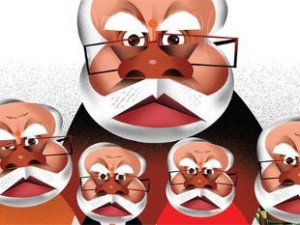Ruchir Joshi | Jun 15, 2014, 05.13 AM IST
If you’re any sort of an average Indian, you will have had a moment, or a series of them in close sequence, when you’ve realized ki okay, I’m an adult now and can (and should) speak up against the family’s wishes, whether it’s about the choice of a wedding sari or brand of new TV or something far more important. Nevertheless, the iron filings of hierarchy and propriety are deeply embedded and the moment we join some adult structure such as a service, job or business the magnet of you-can’t-say-that re-doubles its pull and we tend to get dragged along. Non-desis could be forgiven for thinking we are weirdly hard-wired for obedience: as individual products of this society we are trained to respect and comply with authority figures even though as a people we are socialized to disregard abstract rules and principles.
In the analysis of the recently concluded elections a lot has been made of the fact that many youngsters have broken away from their social group instructions to vote for the person or party they wanted. In that sense, even if it’s a hyperexaggeration to claim that ‘India has spoken’, it’s undeniable that young voters have certainly ‘spoken up’; they’ve risked being rude to their elders, broken ranks with their caste, religious or even ethnic formations and done the electoral equivalent of a chhotey muh badi baat, big talk out of a modest mouth.
Now, we can respond to this ‘speaking up’ in one of two fundamentally opposite ways. One is to treat the new government and its top leadership like a fragile vessel of fine china that must be kept surrounded by cotton-wool and bubble-padding. We can run a tight media bodyguard-cum-escort around the new government, where outriders and self-appointed special protection groups anticipate, scan for, hunt down and stifle anything that might be remotely ‘offensive’ to Narendra Modi’s team, or to his party and its wider network of sympathizers. Certainly the case in Kerala where the authorities have chosen to file criminal charges against a college magazine for lampooning Modi is a good example of this kind of thinking. It’s an attitude that has recent antecedents in the Mamata Banerjee photo-cartoon scandal and the case filed against the two young women in Maharashtra after the death of Bal Thackeray. This approach says two things to the world: one, that our supposedly ruggedly tough leaders actually have very thin skins and are easily offended, and two, that the authorities are willing to go to absurd illegal lengths to mollify politicians’ sensitive egos.
The opposite choice we have is to celebrate the brave, brash new dispensation that has come about via a combative political campaign. People have compared Modi to everyone from Milosevic to Erdogan and worse; it has made little difference to the outcome of these elections; let people continue to say what they will, let them make the comparisons, the Modi government’s riposte should only come through the delivery of widespread development and justice.

June 15, 2014 at 4:39 pm
Sociopaths lack empathy/sympathy. Check their prefrontal cortex in fMRI.